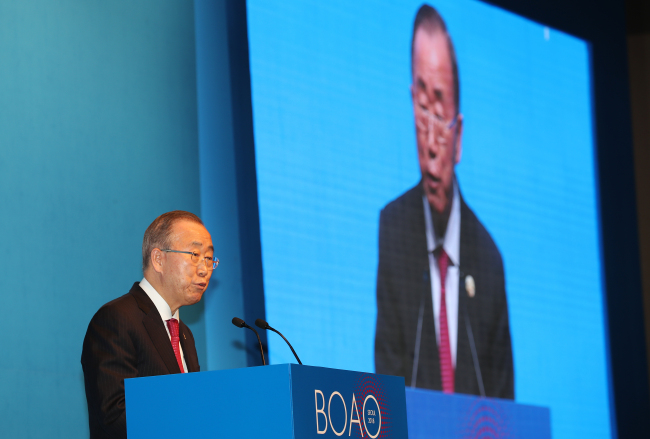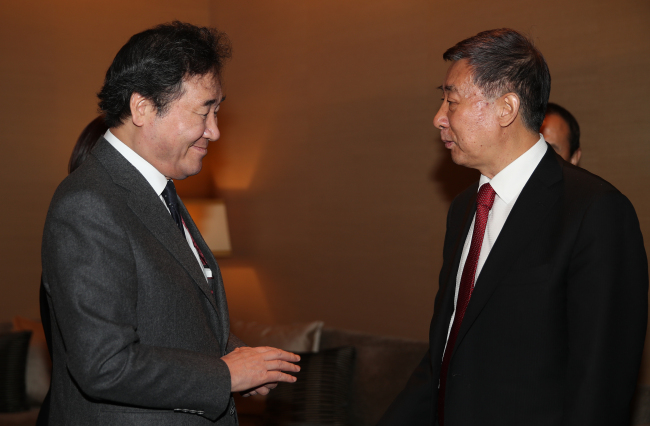Business, political leaders of Korea, China urge Asia to stay open, innovative
Chiefs of SK, GS and Hyundai Motor meet China’s state councilor, seeking ties
By Cho Chung-unPublished : Nov. 20, 2018 - 16:01
“Asia today is facing uncertainties (instigated by) anti-globalization, protectionism and isolationism,” said former United Nations Secretary-General Ban Ki-moon at the Boao Forum for Asia Seoul Conference 2018.
“By pursuing the values of globalization, free trade and multilateralism through regional cooperation and agreements, Asia will have its economic miracle continued and consolidate its position as the growth engine of the world,” he said.

Ban was speaking at the regional program of the Boao Forum, referred to as Asia’s Davos conference, which kicked off Monday. It was the first such event held in Asia outside of China, according to organizers. It was jointly organized by the Federation of Korean Industries, a business lobby group here.
The list of attendees included South Korean Prime Minister Lee Nak-yon, China’s State Councilor Wang Yong, Deputy Prime Minister Kim Dong-yeon, Unification Minister Cho Myoung-gyon, Jeju Island Gov. Won Hee-ryong and Li Baodong, secretary-general of the Boao Forum for Asia.
South Korean business leaders, including FKI Chairman Huh Chang-soo, SK Group Chairman Chey Tae-won and Hyundai Motor Executive Vice Chairman Chung Eui-sun, also attended the event.
The business leaders of Korea’s top conglomerates met Wang minutes before the opening ceremony took place in the afternoon.
Hyundai’s Chung said he told Wang how the automaker’s business operation in China will improve during their meeting.
Hyundai has been struggling in China, in the aftermath of a diplomatic dispute between the two countries last year over Seoul’s decision to deploy an anti-missile system. Its market share in the market dropped 3 percent this year from 9 percent in 2014.
The meeting came amid rumors that the heir to South Korean auto giant Hyundai Motor plans to reshape the carmaker’s business in China, the world’s largest auto market.
SK Group Chairman Chey Tae-won declined to comment on his conversation with Wang. But the chairman appears to have discussed SK’s plan to build its second home base in China under its China Insider Strategy, according to officials.

Under the theme of “An Open and Innovative Asia,” leaders at the forum discussed ways of reinforcing economic partnership and free trade in Asia, and expanding technological development to increase efficiency and productivity in the manufacturing sector.
While expressing concerns over escalating trade conflict between the US and China, participants raised voices to strengthen the trilateral partnership among South Korea, China and Japan.
“If South Korea, China and Japan forge a (trilateral) free trade agreement, it could become the most vibrant economic model in the world,” said Li Yong, board chairman of Chinayong Investment Group. “The trilateral summit held in May where leaders agreed to accelerate efforts to begin negotiations is a signal that the trilateral ties are in the right direction.”
Former South Korean Trade Minister Lee Hee-beom agreed, saying such a trilateral economic partnership would lead into the “era of Pax Asia.”
Ban, serving as chairman of the Boao Forum for Asia, said in his speech that despite dramatic economic growth in Asia, many countries in the region still suffer from poverty and political instability.
But room for growth remains big if there are proper investments of resources and a drive for innovation, he said.
“Innovation is not just a theoretic economic term (that refers to) growth engine, but also is a prerequisite factor for Asia to build bigger miracle,” he said. “Asia should review its past economic models and establish (new) growth strategies based on innovation and in consideration of deteriorating external environment and environmental destruction.”
For sustainable growth, Kwon Oh-hyun, chairman of the Samsung Advanced Institute of Technology, urged leaders to seek an innovative growth model that fit into the dynamics of the “fourth industrial revolution,” while Choi Kwang-chul, head of SK Group’s social contribution committee stressed the importance of pursuing sustainable business for the region.
At a panel discussion, Kwon, the former chief of Samsung Electronics’ chip business, addressed the need to build an open innovation system that processes massive data across the region so that companies and research institution can share innovative ideas for greater development of technology.
By Cho Chung-un (christory@heraldcorp.com)



![[Herald Interview] 'Amid aging population, Korea to invite more young professionals from overseas'](http://res.heraldm.com/phpwas/restmb_idxmake.php?idx=644&simg=/content/image/2024/04/24/20240424050844_0.jpg&u=20240424200058)













![[KH Explains] Korean shipbuilding stocks rally: Real growth or bubble?](http://res.heraldm.com/phpwas/restmb_idxmake.php?idx=652&simg=/content/image/2024/04/25/20240425050656_0.jpg&u=)

